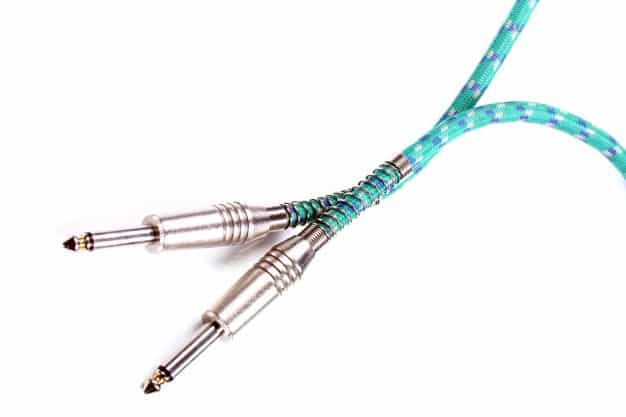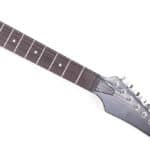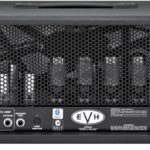Musicians are obsessed with quality sound, and it is no surprise.
Who would ever enjoy having their guitar tone affected by external, unwanted circumstances?
Strings, picks, loudspeakers, guitar finish.
Anything could be a threat if it is not used wisely, and that includes guitar cables.
Believe it or not, guitar cable length affects your tone. Generally, the longer the cables, the weaker the electric signal that comes out from the speaker, which reduces sound quality. On the contrary, short cables don’t change the tone that much.
As you have seen, cables are an important feature in music production.
Now that you know the basics, let’s understand this topic more thoroughly.
Do longer guitar cables deteriorate your signal?
Indeed, the length of your cable affects your signal.
The reason is that pickups push out electric signals that lose power the longer they travel.
In other words, the longer the distance between your guitar and the amp, the more the tone is affected.
This is because the strength of an electric signal is not infinite and tends to deteriorate.
If the cable is too long, then the signal will invariably lose some of its power.
This happens because of capacitance.
Capacitance is the ability of a system to store electric charges.
Longer cables introduce more capacitance. If the capacitance’s too high, then the high-end of your guitar tone will be reduced.
Of course, all this information is relevant and interesting.
However, if you really want to understand the difference, instead of reading, it is better to hear it.
Therefore, here’s a video that exemplifies what you have just read.
Do shorter guitar cables sound better?
If longer cables are worse for your guitar tone, then the opposite is true.
The shorter the guitar cable, the better.
Also, the shorter the guitar cable, the cleaner and clearer the guitar tone.
Short cables introduce less capacitance, which overall allows for a quality high-end sound.
Can different length guitar cables add noise to your tone?
Longer cables add up much noise to the tone since there is a bigger surface area to pick up interference.
In the end, it is another reason why shorter cables are better.
Lastly, a general rule to remember is that cheaper cables (despite their length) tend to pick up more noise.
Therefore, it is advisable to spend a bit more money and acquire a quality cable than “saving” a few dollars and regretting it in the long run.
Are thicker guitar cables better?
Now that we know about capacitance and its effects on guitar tone, it is safe to say that thicker guitar cables are better.
Too much capacitance leads to muddy sounds.
Luckily, thick cables have low capacitance.
What is more, they allow for a stronger signal path.
Thin cables, on the other hand, do the opposite: they have high capacitance and/or weaker conduction.
The best option, then, is to get a thicker cable for your guitar.
That way, no loss of quality sound is guaranteed.
Is cable length the only factor that could affect your sound?
Naturally, cable length solely won’t affect your tone. There are other factors to consider as well.
For example, I already mentioned the importance of quality on cables.
More often than not, cheaper cables will drastically and negatively change the standard sound.
Audio quality will be affected by the material the cable is constructed, too.
For instance, the sound perceived with cables made of copper is warmer, compared to other metals such as silver or gold.
Braided shielding can’t be out of this list either, because it reduces noise.
The same applies to the quality of the solder point. If the solder point is broken then, sure enough, expect to find unpleasant changes in your sound.
Coiled guitar cables vs straight
We have already discussed longer and shorter cables.
Now, what about coiled and straight guitar cables?
Do they differ from one another regarding tone or any other sound perception?
Well, bear in mind that coiled guitar cables are longer than regular straight cables.
By now, you already know that long cables affect high-end.
Therefore, coiled guitar cables remove a lot more of the high frequencies from your tone.
Contrastingly, straight cables pick less interference, so they have little to no effect on tone.
In conclusion, it is far better to play with straight cables, rather than with coiled ones.
After all, having a coiled cable is like having two or three straight cables one linked with the other.
Wireless system vs long guitar cable
I already said that if it is cheap, then it is probably not worth it.
The same rule applies to wireless systems.
A cheap (and therefore, poor quality) wireless system will be no different from a cheap short cable.
If you want the sound to be noticeable, then invest in a more expensive system.
You don’t have to spend a fortune, but do not look for the smallest numbers either.
Now, coming back to wireless systems, they are known for digitalizing the signal and making it analog.
In other words, compressing the dynamic range of the audio deteriorates sound and makes it unnatural.
This is not the same as saying that it adds noise, or reduces quality. It simply alternates it.
Finally, bear in mind that digital systems preserve the original audio quality.
Analog systems, on the contrary, cannot recover it.
Conclusion
In the end, we can come up with the following conclusion: cable length is indeed another feature that affects the final tone.
If that’s the case, then my advice is that you should get shorter cables. Leave longer ones just for rehearsal.
Hope this article has helped you and as always, thank you for reading.

Hello there, my name is Ramiro and I’ve been playing guitar for almost 20 years. I’m obsessed with everything gear-related and I thought it might be worth sharing it. From guitars, pedals, amps, and synths to studio gear and production tips, I hope you find what I post here useful, and I’ll try my best to keep it entertaining also.





